From Mav: I had an interesting experience at the comic book store Wayne works at this week. I was standing around browsing the new releases when a white woman walked into the store with her 9ish-year-old daughter and asked Wayne and the other employees for help finding comics featuring both Shuri and Ironheart. With Shuri, I kind of get this, she was in the two biggest movies of the year last year and the biggest this year and frankly in one of them, she stole the show. Having a quirky and funny teenage female superhero be empowering to a nine-year-old girl makes total sense. With Ironheart, it was a little less clear. The girl didn’t seem to have all that much comics back knowledge. She was quite enamored with Shuri and knew few things about her, but I didn’t get the impression that she was a longtime comic fan other than that. In fact, she didn’t seem to know much about Ironheart at all, other than her name and she was interested in exploring the character. And that’s great, because Riri Williams is awesome, but it’s not clear to me where she ever even heard of the character. She just WANTED to like her.
Honestly, my first thought here was to be really happy about the magic of the moment. Really, I was thinking of the gender and race issues here. It’s great that in a geek world constantly filled with gender-based gatekeeping, a 9yo girl can walk into a comic book store and be that excited about picking up ANY superhero book, much less two of them. Furthermore, I loved that as a little white girl she was excited by two black characters. And she was super excited. She’d clearly been reading Shuri for a while. Ironheart was clearly her attempt to branch out. I don’t know if the fact that both of the characters she was interested in were black occurred to her or not. It honestly didn’t seem like it. She wasn’t saying “hi, I would like to be woke and experience narratives of strong young black women so as to broaden my growing perspectives and not fall into a pattern of fetishizing, demonizing or objectifying the Other as I grow older.” Maybe she was thinking it, but she certainly didn’t say it. These were just the characters that spoke to her. Color be damned. Good for her!
But then I started thinking more about the specific comics that she was reading… and her age. Marvel Comics (publisher of both Shuri and Ironheart) specifically has a whole line of young readers comics that are outside the main continuity and designed for kids. They’re easier to read, they have more cartoony drawing styles. They are the equivalent of G-rated movies. And in being so they sort of inherit the same issues that G-rated movies have. They’re “kid stuff” and kids know they’re kid stuff. Can they be enjoyable? Sure… but they’re designed to be as completely unobjectionable as possible and easy to read. And not every kid wants this. Both Shuri and Ironheart on the other hand are “Rated T for teens” neither has anything really “objectionable” or inappropriate. They’re just not “kids books.” I don’t know this girl. In fact I’m only really guesstimating her age based on her height, appearance and speech patterns. She’s probably a precocious reader who would be bored by the “kids” lines of comics.
My niece is similar. She’s eight, and her favorite comic is Batgirl, also Rated T. I actually got her started off when she was about five reading DC’s Superhero Girls series and she got hooked on the character of Batgirl and apparently bugged my brother and sister-in-law until they bought her a subscription to the on-going Batgirl series. She loves it. But again, this is a kid who is not only a really good reader, but enjoys grown up stories and is not particularly put off by violence. She’s been rooting for Darth Vader since she was like two because she likes to see him kill people. So having a geeky computer expert girl superhero kick ass is perfectly up her alley. Or at least I think that’s why she likes her. I may have to interview her for the show. The point is, the Batgirl comic, while certainly not full of R-rated sex and violence or anything like that, is not catering to eight-year-olds. It’s not a thing where Batgirl solves problems with the power of friendship or anything hokey like that. She hunts down serial killers and kicks the shit out of them. And my niece loves it.
And that’s probably not really that weird. I’ve been reading comic books for nearly 40 years. When I started, there was a truth universally acknowledged that “comics were for kids.” No one really questioned that. No one took anything that was happening in the seriously. They weren’t real literature. It was the era of the Comics Code Authority. Mainstream comics were still presenting themselves as the pristine family friendly cleaned up Silver Age picture of decency that happened in the wake of Frederic Wertham’s Seduction of the Innocent and the Senate Subcommittee on Juvenile Delinquency. Nevermind the fact that the 80s were the time of books I loved like Dark Knight Returns, The Killing Joke, Watchmen, Daredevil: Born Again and Teen Titans: The Judas Contract (a book that fucks me up til this very day… Why Terra? WHY?!?!?) I was reading things far more mature and inappropriate than either of these girls when I was their age… and I turned out fine, right? Right?!?! FUCK YOU!
Anyway, one of the questions I get asked most by people who know I’m a comics scholar is “what comics should my kid be reading?” This is hard. because it really depends on the kid, their reading ability, their maturity level, and their interests. Usually, I assume that anyone asking me that is asking because their kid really wants to get into superheroes, and I try to steer them into some other directions for diversity. I like to recommend Lumberjanes or Mouseguard for instance. But really, one of the things that I’ve been thinking about lately is “what makes something a good kids’ comic, anyway?” And I mean this on two levels. Obviously there’s the question of what are parents looking for when they are looking for comics for their kids. What do you deem appropriate? But I’m also wondering what the kids are looking for. What do they like? Why do they like it? What makes a comic good to them. What makes them think it’s appropriate? And how do we mesh these two perspectives together?
From Wayne: So it’s actually my job to answer these questions, and I’m happy to say it’s a lot easier than it was a few years ago.
As Mav said, back when we were kids it was just assumed that comics were for kids. Thanks to the Comics Code parents were assured that the content was age appropriate. It was unofficial policy at Marvel and DC that their target demographic was 10 to 12 year old boys, and after that they outgrew comics. They were wrong. Mav and I are shining examples of how wrong they were.
But several things happened. The creation of the Direct Market meant that not all comics had to be approved by the code any more, leading to its erosion and eventual disappearance. Fans grew up and comics grew up with them. One of the problems with the aforementioned unofficial policy is that less and less content was being created for young girls, so they didn’t grow up reading comics. By the 1980s comics being a boy’s club had not only become a self-fulfilling prophecy, it had turned into a man’s club. The amount of material being created for kids was thin on the ground.
Fewer and fewer places like drug stores and newsstands carried comics. If you didn’t already go to a comics specialty store it would be easy to not even know comics were still being made. The business decisions of the industry had pretty much eliminated an entire generation of new readers.
There were attempts. Marvel launched their Star line of comics, specifically designed to appeal to young readers. You’ve really never heard of any of them, other than the Ewoks, because they all failed pretty miserably. Jeff Smith’s Bone was an unexpected success in the early 90s and is still a big hit with readers of all kinds. But there was little else for a long time.
I used to say, jokingly to friends, that when someone came into the store and asked what I would recommend for a ten year old who wanted to get into comics, my answer would be, “another hobby.” Most of the mainstream Marvel and DC books had content that was just too mature for most young readers. It was a little easier for boys. For girls, I just had to shake my head and wish.
Then Manga became a thing. Suddenly giant bookstore chains were carrying shelves of translated Japanese graphic novels, many of which were aimed at a young female audience. I believe this created a generation of fans, outside of the comic book stores and traditional fandom, who then grew up wanting to read more comics (and many of them started making their own comics). I’ve seen the demographic in my store change dramatically in the last twenty years from around 80% or more male customers to a pretty equal 50-50 split in our under 30 crowd.
And I think it’s because they were exposed to good comics as kids.
These days it’s really easy to find books for younger readers, from a wide variety of publishers, including the big two (I sold a copy of a YA Spiderverse Miles Morales graphic novel while writing this).
So I guess a lot of my approach to this comes from the retail end of things, and seeing how that has changed. But I’m also interested in talking about why I think (we think), comics are important for kids. Some of that is just because I believe reading is important, in whatever form it takes. But I also remember being a kid, and though I read a little bit of everything, comics were just the shit. For whatever reason they spoke me like nothing else did. They do for a lot of people. I want to explore why we think that is.



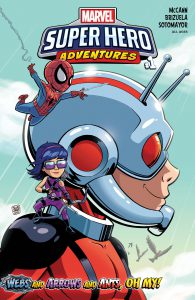
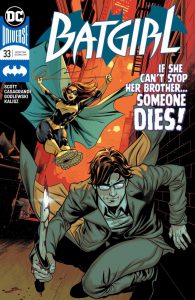

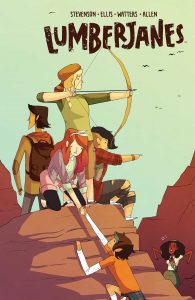

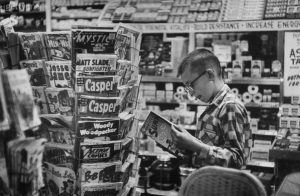

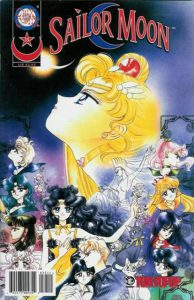
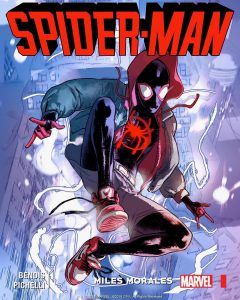


I’m not a parent and I don’t know any kids but I do have thoughts/feelings about comics related to my own childhood and how I grew up with them.
I’m going to take a stab that Ironheart is popular because of the “Marvel Rising” cartoon on Disney… or YouTube or… wherever the hell it is. They also made a girl’s line of dolls (like the DC Superhero thing Mav mentioned) that are in Target. I MAY only know about this because they have a Squirrel Girl doll… which also comes in two flavors, one with and without a special hat/outfit (just like in that Simpsons episodes!) Annnnyyways….
I got into comic stuff around 8 thanks to Fox Kids cartoons and a few years later watching anime like Robotech which involved love triangles, abusive relationships, and I guess incest (anime is weird sometimes?) So… part of me wants to say this stuff is for everyone. Some of that stuff in DC’s animated Batman? That shit wasn’t for kids, really… it was pretty dark a lot of the time.
I think, at the end of the day, it’s great having people like Wayne in a store who can help guide parents to getting stuff that’s appropriate for their kids and navigating which books might be TOO mature because they feature Batman and Catwoman boinking on a rooftop or something.
I do wish that the “All Ages” stuff was easier to navigate though. Case in point is Marvel Rising. The first series came out as a set of 4 or 5 different #1 issues with similar titles. The animated series came out on YouTube and then on TV and just seemed like a jumbled mess. I don’t exactly know what their marketing plans for that stuff are, but you’d think if you’re trying to get people in off the street you’d make things as simple and easy to access as possible.
Great article. Comic books arent my thing instead my geekdom is due to playing magic cards. I do like that they have the tons of variety to be more personalized like the old school nightmare on elm street ones which I’d have a subscription If they still made
Interesting about the slide into comics via anime/manga. That’s exactly how my 16 year old daughter, an avid reader, got from princess/fairy/magic/Greek mythology to Avengers somewhere between ages 12 to 16. I’m not sure she has ever read an actual comic book though. But she went from “I’ll wait in the car” to “Dad, there’s a comic book shop can we stop?” Contrast with my 10 year old who learned to read on Marvel Origin Stories, has a subscription to comic books, and has had a 36” Spider-Man since she was about that tall. Two different paths to the same store.
Interesting, thought provoking article here.
Building off what you’ve already said, I think that due that the direct market and the end comics authority code have allowed comics to shift to an older market. I’m part of that crop of boys who never stopped reading comics, and there are a lot of us. In general, the market seems grim and gritty.
What happened is that comics became a lot less “fun.” And there’s obviously not a lot of money in “fun” books, because Marvel and DC would be making more of them.
I, for one, miss this. I like “Ms Marvel” and “Moon Girl And Devil Dinosaur” as fun titles. I’m not a fan of silly stories, but these do a good job of presenting stories with kid appropriate situations and jeopardy.
I have kids of my own, and they are far more sophisticated than I was at their age. But that said, I still don’t feel like there are a lot of good entry level comics for kids. There’s a full run of Gotham Adventures in my daughter’s room right now.